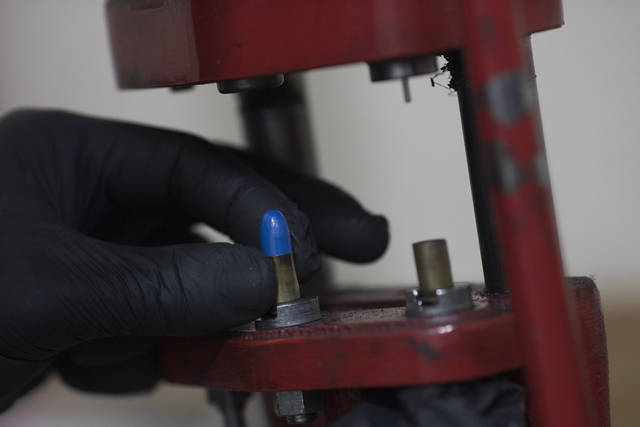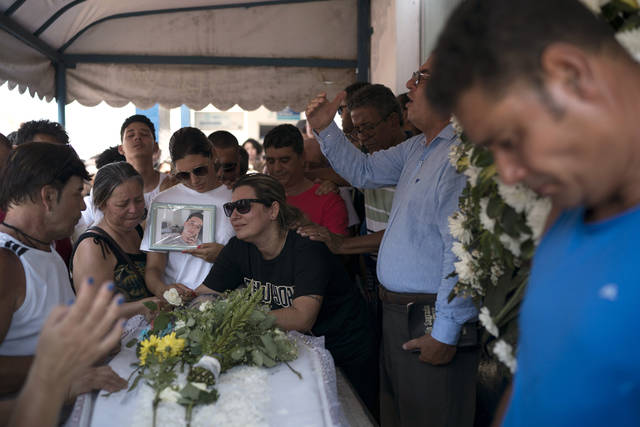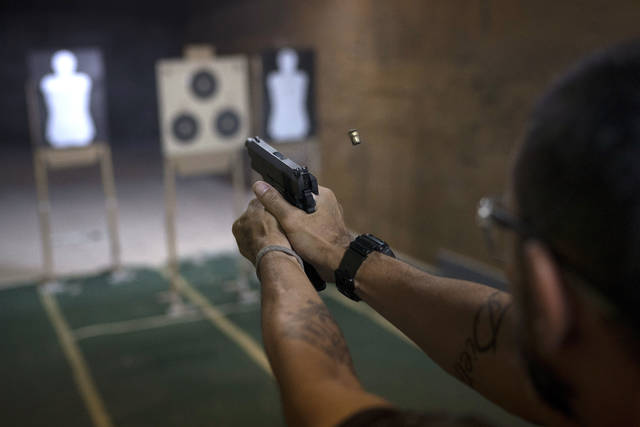Fear and zeal over more guns in violence-plagued Brazil

In this Jan. 10, 2019 photo, gun instructor Jorge Moura makes ammunition to be used at the Calibre 12 gun club in Sao Goncalo, Brazil. President Jair Bolsonaro took a first step toward dramatically increasing the number of guns in Brazil, the nation that leads the world in total homicides. (AP Photo/Leo Correa)

In this Jan. 17, 2019 photo, Carla Cristina Santos grieves over the open-coffin holding her 22-year-old son Matheus Lessa in Rio de Janeiro, Brazil. Lessa was shot and killed while trying to protect his mother during a robbery in their family-owned store. (AP Photo/Leo Correa)

In this Jan. 10, 2019 photo, Rildo Anjos, owner of the Calibre 12 gun club, fires his pistol during a practice session at the club in Sao Goncalo, Brazil. President Jair Bolsonaro’s plan to loosen gun laws in Brazil has been met with both fear and enthusiasm in a nation that is the world’s leader in annual homicides. (AP Photo/Leo Correa)
SAO GONCALO, Brazil — Fearing for his safety amid rising crime in Latin America’s largest nation, Paulo Alberto joined a gun club three years ago and learned to shoot. But he says Brazil’s tight carry laws that mean he can’t take his gun anywhere but to the club limit his ability to protect himself outside his home.
SAO GONCALO, Brazil — Fearing for his safety amid rising crime in Latin America’s largest nation, Paulo Alberto joined a gun club three years ago and learned to shoot. But he says Brazil’s tight carry laws that mean he can’t take his gun anywhere but to the club limit his ability to protect himself outside his home.
“The current laws are very strict and end up helping out the thugs,” Alberto said between rounds at the Calibre 12 gun club in this city across Guanabara Bay from Rio de Janeiro. “We need laws to make it easier to both possess and carry guns.”
It’s a view held by many, including Brazil’s new President Jair Bolsonaro. On Tuesday, Bolsonaro, a former army captain who waves to supporters with his hands in the shape of pistols, took a first step toward dramatically increasing the number of guns in Brazil, the nation that leads the world in total homicides.
By decree, Bolsonaro eliminated the requirement that aspiring gun owners justify to federal police officials why they need a firearm, creating instead a wide range of qualifying circumstances. The categories are so broad — citizens living in rural areas, those in urban areas with high levels of homicide, business owners, gun collectors and hunters — that just about any citizen age 25 or older wanting a firearm could effectively get one.
Prospective gun owners must still meet requirements that include not having a criminal record, taking a psychological exam and getting training from a gun club. And the restriction most despised by gun proponents — the right of civilians to carry — remains intact, at least for now.
During Tuesday’s announcement, Bolsonaro said that more reforms would be “pursued legislatively,” referring to carry laws.
Such changes energize supporters and are a potential boon for major gun makers. On Bolsonaro’s first day in office earlier this month, stocks of gun manufacturer Forjas Taurus jumped 30 percent.
For civil rights groups, security experts and many in Brazil’s violence-wracked slums the potential changes are terrifying.
Myriad studies in Brazil and the United States show that more guns lead to higher homicide rates. That is a scary prospect in a country that in 2017 broke its own record for murders, with nearly 64,000 killed — 70 percent by firearms — the most recent figures available.
“We are talking about life and death,” said Ilona Szabo, co-founder of Igarape, a think tank that focuses on public security. “This is not something to play with in the most murderous country in the world.”
Szabo and other security experts argue that instead of expanding access to guns, current guns laws should be more rigorously enforced.
In a scathing editorial titled “Reckless Decree,” the Rio de Janeiro daily O Globo said there was already little oversight of gun owners and noted that a major investigation by Rio de Janeiro’s state legislature in 2011 found that the vast majority of illegally trafficked guns started out legal.
“There is no guarantee that facilitating (gun) possession will be paired with any effective control,” it said.
Bolsonaro’s decree made no mention of beefing up the current reporting system. In contrast, it extended the license renewal period from five to 10 years. In Congress, the pro-gun lobby known as the “bullet caucus” has made clear its focus is deregulation, not adding more administrative hoops.
Since major legislation to tighten gun laws was passed in 2003, the pro-gun lobby has put forward several bills to expand access and availability of firearms. These include sanctioning the carrying of concealed weapons, increasing the number of guns an individual can own and how much ammunition they can buy.
Those bills have been defeated by the previous four administrations led by the left-leaning Workers’ Party. But political analysts say Bolsonaro’s strong electoral victory in October combined with deep frustration over violence means they now have a good chance of passing.
Still, polls have consistently shown that a majority of Brazilians are not convinced that more guns are a good idea.
A Datafolha poll published at the end of last year found that 61 percent of those surveyed believe firearms should be prohibited and pose a threat to others. The poll, which surveyed 2,077 people, had a margin of error of 2 percent.
Similar to arguments made by the National Rifle Association in the U.S., supporters of loosened gun laws frequently argue that “guns don’t kill people, people kill people.”
The debate comes with a disconcerting backdrop: Nobody knows how many guns are already in circulation in Brazil, a nation of 210 million people bordered by more than half a dozen countries.
In the wake of the 2003 legislation to restrict firearm possession, studies estimated the number of guns at around 17.5 million, both legally and illegally owned.
Since then, however, security experts say there have been no definitive studies, in part because the tracking of guns has never been properly funded or implemented.
Proponents of looser regulation contend that, given the failure of successive governments to ensure security, citizens have a right to protect themselves by being armed.
But an incident involving Bolsonaro himself would seem to illustrate how carrying a gun doesn’t necessarily mean protection. In 1995, the then congressman was confronted by two gunmen while riding his motorcycle in Barra da Tijuca, an affluent Rio neighborhood.
They stole Bolsonaro’s motorcycle and a Glock 380 pistol, which he was allowed to carry as a former member of the military.
“Even armed, I felt defenseless,” Bolsonaro told local newspapers at the time.
Despite the incident, Bolsonaro and other administration officials argue civilians need guns to protect themselves.
Sen. Major Olimpio, a member of Bolsonaro’s party, said earlier this month that Congress would move toward repealing parts of the 2003 disarmament legislation.
“It’s a big fallacy to say that guns will increase violence,” Olimpio told Globo News TV. “Illegal weapons are involved in crimes.”
Guns possessed illegally are at the center of many crimes in Brazil, particularly those involving drug-trafficking gangs, who often brandish automatic weapons in the poor neighborhoods they control. However, these weapons often start out as legally owned by police, military personnel or the security companies many rich people hire for safety.
Given the reality that many guns wind up in criminals’ hands through theft or corruption, opponents of more lax laws argue that more legal guns will only translate into more illegal guns and crime.
Among them is 32-year-old Camila Lima, who was hit by a stray bullet in the neck when she was 12 during a shootout between criminals and security guards in her Rio neighborhood that left her paralyzed.
She and her mother lobbied in favor of the 2003 legislation to tighten gun laws, and regret that the country is going in the other direction.
“If government officials want to arm the population, they should include a clause saying that they will be responsible for the victims,” Lima said. “I was shot, nobody took responsibility for that.”
Still, in a country where violence plays an outsized role in everyday life, some victims of gun violence believe the solution is arming up.
On Tuesday night, just hours after Bolsonaro issued his gun-law decree, 22-year-old Matheus Lessa was shot and killed while trying to protect his mother during a robbery in their family-owned store in Rio de Janeiro.
At his son’s funeral on Thursday, Luciano Lessa lamented that the family had no way to protect itself.
“The criminals can walk around armed, so why not working people?” a distraught Lessa asked. “We have to wait for them to shoot us like they shot my son?”
—————
Associated Press writer Marcelo Sousa de Silva and video journalist Yesica Fisch in Rio de Janeiro contributed to this report.
—————
Follow Peter Prengaman: twitter.com/peterprengaman

